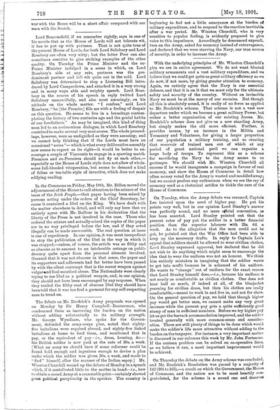On Tuesday, when the Army debate was resumed, Captain Lee
insisted upon the need of higher pay. He put his points very well, but in our opinion Lord Stanley's answer was perfectly sound, and no mere official convention, as has been asserted. Lord Stanley pointed out that the present rates of pay put the soldier in a better financial position than the superior labourer with 25s. 6d. a week. As to the allegation that the men could not be got, he pointed out that the War Office had been able to keep up the necessary drafts. In reply to Captain Lee's appeal that soldiers should be allowed to wear civilian clothes, Lord Stanley expressed approval, but declared that he did not wish to do anything which might seem to encourage the idea that to wear the uniform was not an honour. We think him entirely mistaken in imagining that the soldier wants to get into mufti because he is ashamed of his uniform. He wants to " change " out of uniform for the exact reason that Lord Stanley himself does,—i.e., because his uniform is not nearly as comfortable as civilian clothes. One does not hear half so much, if indeed at all, of the bluejacket yearning for civilian dress, but then his clothes are really comfortable,—meant to work in and live in, and not for show. On the general question of pay, we hold that though higher pay would get better men, we cannot make any very great increase while the present pay gets a quite sufficiently good stamp of man in sufficient numbers. Before we try higher pay let us get the barrack accommodation improved, and the soldier treated generally with more common-sense and consider- ation. There are still plenty of things to be done which would make the soldier's life more attractive without adding to the burden on the taxpayer. For instance, a very important matter is discussed in our columns this week by Mr. John Fortescue. If the canteen problem can be solved on co-operative lines, as we believe it can, a most important improvement would be achieved.






































 Previous page
Previous page